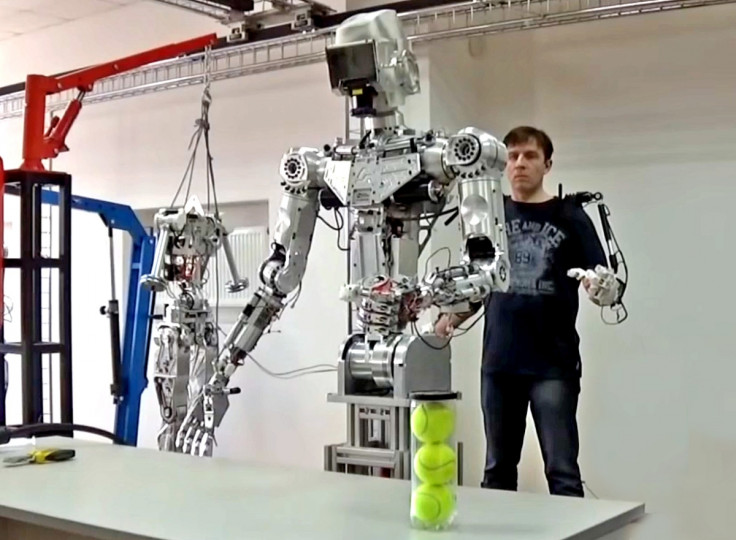Terrifying robot trained to shoot using both hands is 'not a Terminator', Russian deputy PM says
Training the robot to shoot will teach it to set priorities and make instant decisions, he said.

Russia's humanoid robot Fedor (Final Experimental Demonstration Object Research), designed to go on missions into space with Russian cosmonauts by 2021, is being trained to shoot guns using both arms. Dubbed the "cyber cosmonaut", the robot's latest activity will help improve its motor skills and decision making, Russia's Deputy Prime Minister Dmitry Rogozin who oversees the country's defence and space sectors said.
In a series of posts on Twitter and Facebook, Rogozin shared multiple photos and a brief video showing off some of the robot's new skills firing off a pair of pistols at a target board with impressive precision using both hands. The message accompanying the quick clip reads: "Russian fighting robots — guys with iron nature."
"Robot platform FEDOR showed shooting skills with two hands," Rogozin wrote. "We are not creating a Terminator, but artificial intelligence that will be of great practical significance in various fields."
He added that training the robot to shoot will teach it to instantly set priorities and make decisions.
Unveiled in 2016 by the Russian military's research arm, the Russian Foundation for Advanced Research Projects, FEDOR has already been taught various skills including walking upright, doing push ups, lifting weights, operating a drill, screwing in a lightbulb, inserting a key into a lock, opening a door and even driving a car.
The six-foot tall robot weighs around 233 pounds and can lift up to 44 pounds of cargo. It can also be controlled remotely by a person in a special suit and work autonomously as well in response to voice commands.
Developed by Android Technics and the Advanced Research Fund, the humanoid robot will be sent to the International Space Station and tasked with taking on missions and tasks deemed too dangerous for humans in space.
"Combat robotics is key to making intelligence machines," Rogozin tweeted. "This is applicable to areas including aviation and space."
Робот платформы F.E.D.O.R. показал навыки Ñтрельбы Ñ Ð´Ð²ÑƒÑ… рук. Идёт работа над мелкой моторикой и алгоритмами принÑÑ‚Ð¸Ñ Ñ€ÐµÑˆÐµÐ½Ð¸Ð¹@fpi_russia pic.twitter.com/jREgpgEy14
— Дмитрий Рогозин (@Rogozin) April 13, 2017
РуÑÑкие боевые роботы - парни Ñ Ð¶ÐµÐ»ÐµÐ·Ð½Ñ‹Ð¼ характером @fpi_russia pic.twitter.com/qbflvn5HFy
— Дмитрий Рогозин (@Rogozin) April 14, 2017
The robot is expected to be the sole passenger on board Russia's Federation spacecraft first launch into space in 2021.
"During space walking missions and on other planets, astronauts will rely on robots," director of the National Center for Technology Development and Basic Robotics and head of the project Sergei Khurs said earlier. "Their capabilities are equal to those of humans, and in some ways even exceed them."
© Copyright IBTimes 2025. All rights reserved.





















